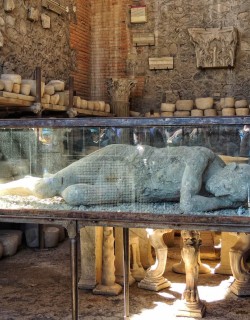Rome certainly isn't the only ancient city in Italy. Whether you're interested in ancient statues, baroque art, or indulging in the best pizza and coffee in the entire world, consider taking a day from the Eternal City, possibly an endless day trip, to Naples. It is a short and inexpensive train ride from Rome and worth more than you can bargain for. And in Naples, you can literally bargain for just about anything.
While one tends to associate antiquity and Italian origins with Rome, Naples was actually the first major metropolis on the boot. For clarity’s sake, the original Naples was actually a tad north of the contemporary center of the city. In its origins, she was called Parthenope, named after one of the mythological sirens in Greek literature.
According to one of the legends, Greeks, coming from the island of Rhodes were on an adventure, searching for the lost city of Atlantis, which they for some reason thought was located in the Tyrrhenian Sea, close to Sardinia, however they stopped off in the Bay of Naples, presumably just a bathroom break before they continued their journey. But the Greeks fell in love with the land now know as Naples and all its natural beauty and all its pizza and sfogliatelle and they never left.
According to another legend, after Odysseus tied himself to his boat as to not fall for the old singing siren trick, Parthenope, who was one of those three seductive sirens, died from a the malady known as self-pity and she washed up onto the shore of modern day Naples. Some say that she was so large that her body actually formed the outline of the bay itself. Others argue that she was normal siren-sized and just washed ashore like any other narcissistic, self-pitying victim of odyssean wit would have. Both legends seem unlikely.
Roman myth has it that there was a centaur named Vesuvius and he was in love with this beautiful siren. Jupiter, being the home-wrecker that we all know he was, turned Vesuvius into a volcano and Parthenope into a city. This seems equally unlikely.
Regardless of legend, fact is that some time after the city of Parthenope was established, the Greeks found that area just south of their new city would be even more adept to their metropolitan needs. The land now known as Naples had a better natural port than Parthenope and so Naples (Neopolis in Greek) was born under the Magna Grecia.
Neapolis, literally meaning “new city” in Greek, exemplifies the beauty and contradiction of the city itself. Now one of the oldest still inhabited cities in the western world, is actually named “new city.” Full of ruins, completely accessible and often right under your nose, Naples Tours make for some of the most interesting sightseeing adventures in Italy. From the National Archeological Museum that displays countless artifacts to the original Greek walls of the city in Piazza Bellini. Naples is also the gateway to the historic city of Pompeii and the amazing Amalfi Coast, which are well worth doing if you are making the trip down there. If anything, a trip to Naples is worth it just to eat a pizza margherita at Sorbillo’s on Via dei Tribunali and to drink a coffee incomparable to anywhere else in the world. Then, if you have time between coffees and pizzas and pastries, take a tour. See what the most unsung producer of western culture has to offer.
~ Tony Mastroianni ~



